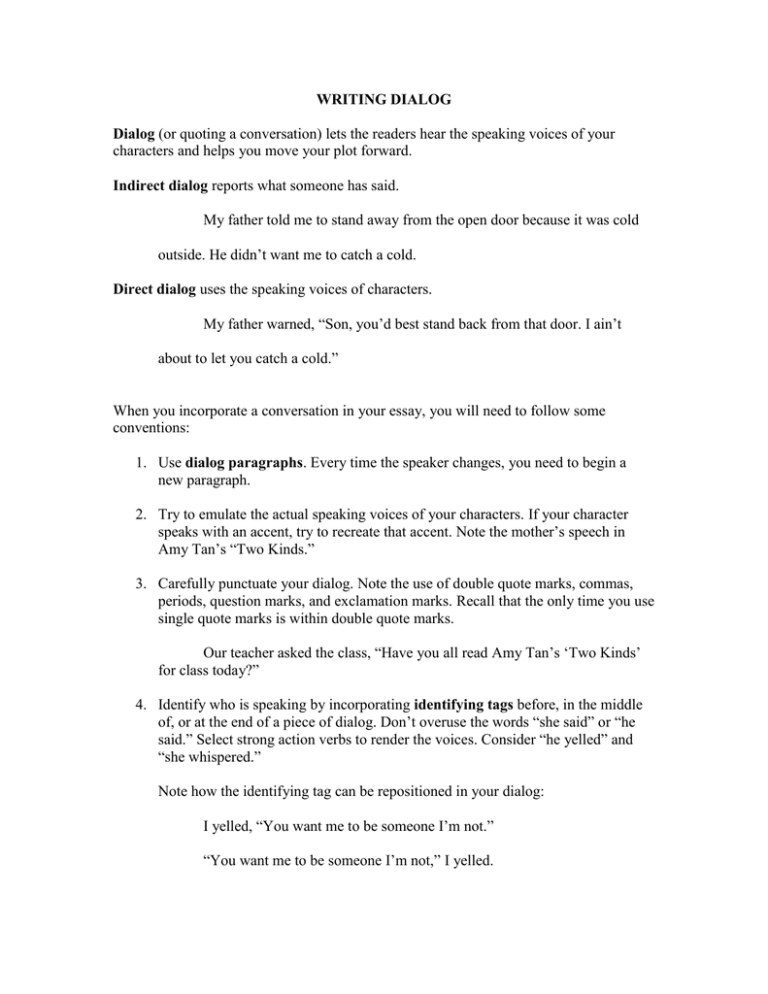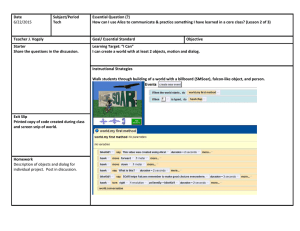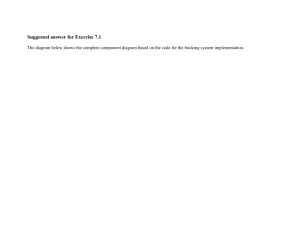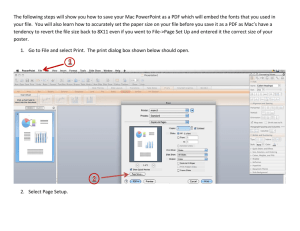WRITING DIALOG Dialog Indirect dialog
advertisement

WRITING DIALOG Dialog (or quoting a conversation) lets the readers hear the speaking voices of your characters and helps you move your plot forward. Indirect dialog reports what someone has said. My father told me to stand away from the open door because it was cold outside. He didn’t want me to catch a cold. Direct dialog uses the speaking voices of characters. My father warned, “Son, you’d best stand back from that door. I ain’t about to let you catch a cold.” When you incorporate a conversation in your essay, you will need to follow some conventions: 1. Use dialog paragraphs. Every time the speaker changes, you need to begin a new paragraph. 2. Try to emulate the actual speaking voices of your characters. If your character speaks with an accent, try to recreate that accent. Note the mother’s speech in Amy Tan’s “Two Kinds.” 3. Carefully punctuate your dialog. Note the use of double quote marks, commas, periods, question marks, and exclamation marks. Recall that the only time you use single quote marks is within double quote marks. Our teacher asked the class, “Have you all read Amy Tan’s ‘Two Kinds’ for class today?” 4. Identify who is speaking by incorporating identifying tags before, in the middle of, or at the end of a piece of dialog. Don’t overuse the words “she said” or “he said.” Select strong action verbs to render the voices. Consider “he yelled” and “she whispered.” Note how the identifying tag can be repositioned in your dialog: I yelled, “You want me to be someone I’m not.” “You want me to be someone I’m not,” I yelled. “You want me,” I yelled, “to be someone I’m not.” Note the dialog paragraphs, Chinese-American accent, punctuation, and identifying tags in Amy Tan’s in “Two Kinds”: “You want me to be someone that I’m not!” I sobbed. “I’ll never be the kind of daughter you want me to be!” “Only two kinds of daughters,” she shouted in Chinese. “Those who are obedient and those who follow their own mind! Only one kind of daughter can live in this house. Obedient daughter!” “Then I wish I wasn’t your daughter. I wish you weren’t my mother,” I shouted. As I said these things I got scared. It felt like worms and toads and slimy things crawling out of my chest, but it also felt good, as if this awful side of me had surfaced, at last. “Too late to change this,” said my mother shrilly. And I could sense her anger rising to its breaking point. I wanted to see it spill over. And that’s when I remembered the babies she had lost in China, the ones we never talked about. “Then I wish I’d never been born!” I shouted. “I wish I were dead! Like them!”



